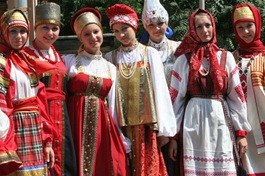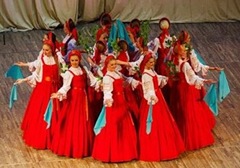Статьи
Vocabulary for IELTS: Traditions — Как расширить словарный запас?
- 10.11.2009
- Сообщение от: Елена Амерханова
- Категория: Как учить английский Словарный запас

“Customs may not be as wise as laws, but they are always more popular”
Benjamin Disraeli
If you reject the food, ignore the customs, fear the religion and avoid the people, you might better stay at home.
James A. Michener
 Нас часто спрашивают, как лучше учить слова и выражения при подготовке к экзаменам. Мы считаем, что эффективнее пополнять словарный запас через упражнения по всем аспектам экзамена (Listening, Reading, Writing, Speaking) на одну конкретную лексическую тему. Не секрет, что в экзаменах встречается ограниченное количество тем. Конечно, заучивать наизусть тексты не стоит, а вот запомнить полезные слова и выражения нужно — чтобы употребить их в спонтанной речи на экзамене. Именно по такому принципу построены замечательные пособия, которые мы используем с нашими Skype учениками, издательства Cambridge “Vocabulary for IELTS”, “Objective IELTS” и др. Однако, в экзаменах часто попадаются такие темы, которых нет в учебниках для подготовки, поэтому мы решили открыть этим постом серию статей Vocabulary for Exams.
Нас часто спрашивают, как лучше учить слова и выражения при подготовке к экзаменам. Мы считаем, что эффективнее пополнять словарный запас через упражнения по всем аспектам экзамена (Listening, Reading, Writing, Speaking) на одну конкретную лексическую тему. Не секрет, что в экзаменах встречается ограниченное количество тем. Конечно, заучивать наизусть тексты не стоит, а вот запомнить полезные слова и выражения нужно — чтобы употребить их в спонтанной речи на экзамене. Именно по такому принципу построены замечательные пособия, которые мы используем с нашими Skype учениками, издательства Cambridge “Vocabulary for IELTS”, “Objective IELTS” и др. Однако, в экзаменах часто попадаются такие темы, которых нет в учебниках для подготовки, поэтому мы решили открыть этим постом серию статей Vocabulary for Exams.
Про традиции спрашивают на всех международных экзаменах – IELTS, TOEFL, FCE, CAE, CPE. Чаще всего эта тема встречается в Speaking и Writing. К сожалению, для кандидатов из России порой эта тема оказывается трудной, так как со школьной скамьи привыкли учить английские/американские праздники и обычаи. На экзаменах же спрашивают о народных традициях, обычаях и суевериях Вашей родной страны. Да и в жизни Вам пригодятся эти умения и знания – ведь иностранцы сами знают о своей стране, а вот о Вашей им будет интересно послушать.
Phrases
- to break with tradition- нарушить традицию
- to become a tradition – войти в традицию
- to establish a tradit
 ion – положить начало традиции
ion – положить начало традиции - to observe traditions – соблюдать традиции, to adhere to the tradition – придерживаться традиций, by tradition – по традиции
- to transmit tradition to the younger generation, to pass a tradition down to the next generation – передавать традицию следующему поколению
- to keep up the family traditions – сохранять семейные традиции
- deep-seated/deeply rooted tradition – глубоко укоренившаяся традиция, iron-bound tradition – твердо установившиеся традиции
- cherished tradition — бережно хранимая традиция
- an outmoded custom – отживший обычай
- pagan custom – языческий обычай
- to revert to a custom – возродить обычай
- to domesticize a custom – перенять обычай
Listening
- Culture Contrast– хороший подкаст о различиях культур, можно слушать и читать.
- Thanksgiving and Christmas: Holiday Traditions – про праздничные традиции, упражнения на аудирование и вокабуляр.
- Про то, как русские не празднуют Рождество – очередное видео-доказательство того, как мало за рубежом знают о России и наших традициях.
Reading
- Wikipedia –
 о традициях и суевериях России.
о традициях и суевериях России. - Russian Borsch – рецепт русского национального блюда – борщ. Видео.
- WaytoRussia.net – интересная статья, написанная от лица россиян про традиции и национальный характер.
- Russian Weddings — о традициях русской свадьбы в блоге BBC
- Russian Wedding— краткая информация
- CambridgeWorkbook – упражнения на чтение, письмо и вокабуляр, связанный с традициями.
Writing
1. When people move to another country, some of them decide to follow the customs of the new country.
Others prefer to keep their own customs. Compare these two choices.
Which one do you prefer? Support your answer with specific details.
2. It is inevitable that as technology develops so traditional cultures must be lost. Technology and tradition are incompatible — you cannot have both together. To what extent do you agree or disagree?
3. Do you agree or disagree with the following statement?
Modern technology is creating a single world culture.
Use specific reasons and examples to support your opinion
- If you were asked to send one thing representing your country to an international exhibition, what woudl you choose? Why? Use specific reasons and detaila to explain your choice.
- Would you prefer to live in a traditional house or in a more modern apartment building? Use specific reasons and details to support your choice.
- There are many different types of music in the world today. Why do we need music? Is the traditional music of a country more important than the international music that is heard everywhere nowadays?
You have received the following letter from your English-speaking friend.
…We’re doing a project this month at school on eating habits and customs around the world. Will you be able to help me by telling me what the traditional meals are in your country, what people typically eat and at what time of day?
Thanks very much!
Love, Alison
Write a letter to your friend giving her the information she needs (around 120-180 words).
Speaking Questions
Part 1. Questions
- Do children in your country learn traditional songs which their grandparents also know? What are these songs about? What instruments are used to play these songs?
- What traditional food and drinks do you have in your country?
Part 2. Card
Describe a national festival or celebration in your country.
You should say:
- what is celebrated and when
- what people do during the festival
- what the atmosphere is like
and explain why it is important to you.
——————————
Describe a traditional dish in your country.
You should say:
- what the dish is (how it looks and tastes like) and how it is prepared
- when it is usually eaten
- what the significance or importance of this dish is
and explain why you like or dislike this dish.
—————————-
Describe a traditional wedding ceremony in your country.
You should say:
- What clothes do people wear for it
- What happens during the ceremony
- What presents do people give
And say whether people observe these traditions nowadays or not and why.
Part 3. Follow-up Questions
- What role do traditional ceremonies play in the social life of people in your country?
- What traditions were important for your grandparents, say 50 years ago?
- And which traditions are we likely to continue to celebrate in the future?
- How would you describe young people’s attitudes towards tradition?
- Do you think customs and traditions are changing these days?
- Do you think traditions and customs are affected by advertising?
- Do some countries celebrate traditions more than others?
- Do you believe that the young generation is not following the old traditions?
- Talk about an important national holiday in your home country. Describe it and explain why it is important.
- Tradition VS latest fashion & which one do you prefer & why ?
- Have you ever had a culture shock?
- Imagine you have a friend who is suffering from a culture shock. What would you do to help them?
- Do you think we should maintain our traditions or make way for change?
- Describe the traditional clothing.
- Describe a traditional wedding ceremony in your country.
- In Britain, when you are invited to a dinner party, it is traditional to bring a bottle of wine and flowers or chocolates for the hostess. It is normal to arrive on time, but not too early. What happens in your country?
- What are the traditional sports in your country? Is your country still good at these sports?
- In very traditional British schools, the pupils stand up when the teacher enter
 s the room. Teachers used to wear square black hats and long black gowns. It is also traditional to have school assemblies before morning lessons and to sing a special school song at the end of term. Do schools in your country have similar traditions?
s the room. Teachers used to wear square black hats and long black gowns. It is also traditional to have school assemblies before morning lessons and to sing a special school song at the end of term. Do schools in your country have similar traditions? - «Cultural differences cause problems. It is better for people to stay in their own countries rather than to migrate to other ones.» Do you agree?
- Would you prefer to live in a monoculture or a multi-racial society? Why?
- “It is better to study major international languages like English rather than to spend time on minority languages for the sake of regional identity.» Do you agree?
- Is it better to marry someone of the same cultural background?
- “Religion as a school subject should include all the major world religions — not only the majority religion in the country concerned.» Do you agree?
Compare and contrast the pictures:

Compare and contrast the pictures:

Автор: Elena
6 отзывов
Комментарии закрыты

Не за что =). Будут вопросы- обращайтесь еще.
Спасибо большое за оперативный ответ! Замечательные сайты!
Добрый день, Лена!
Мне очень нравится словарь Visual Dictionary, Merriam Webster:
http://visual.merriam-webster.com/
Там очень много тем, картинок, можно прослушать произношение слов и прочесть их определения на английском.
Есть еще сайты:
http://www.online-languages.info/english/pictures.php
http://www.infovisual.info/ тоже популярный сайт- потемный словарь с картинкам но без звука.
http://www.pdictionary.com/ — картинки со словами без звука.
Елена, извините, может, вопрос немного не по теме. Не могли бы вы порекомендовать хорошие ресурсы по запоминанию слов по темам (например, одежда, здоровье…) с транскрипцией и картинками?
Vocabulary for IELTS создан специально для тех, кто готовится к сдачи IELTS. Именно поэтому там юниты разбиты по темам, а слова отрабатываются в упражнениях, которые встречаются в IELTS экзамене — Listening, Reading, Writing и Speaking.
В Vocabulary in Use, на мой взгляд, юниты короче, а упражнений для запоминания слов не всегда достаточно и они слишком прямолинейны. Ученик видит то, что написано слева и вписывает на страницу справа.
Интересная подборка. Кстати, вот Vocabulary for IELTS, например, мне гораздо больше нравится, чем серия English vocabulary in USE разных уровней. В первой книге много небольших юнитов и как-то более лакончино все сделано, в плане упражнений и количества новых слов. В общем лучше усваивается что ли. Вторая же серия — её нужно уметь использовать, ибо сотни новых фраз просто забудутся.
В общем, вопрос не в том где найти полезные словосочетания и новые слова, а как это все в голове удержать:)